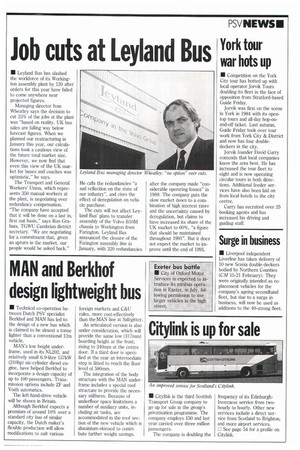Job cuts at Leyland Bus
Page 19

If you've noticed an error in this article please click here to report it so we can fix it.
• Leyland Bus has slashed the workforce of its Workington assembly plant by 120 after orders for this year have failed to come anywhere near projected figures.
Managing director Ivan Wheatley says the decision to cut 25% of the jobs at the plant was "based on reality. UK bus sales are falling way below forecast figures. When we planned our restructuring in January this year, our calculations took a cautious view of the future total market size. However, we now find that even this view of the UK market for buses and coaches was optimistic," he says.
The Transport and General Workers' Union, which represents 350 manual workers at the plant, is negotiating over redundancy compensation. "The company have accepted that it will be done on a last in, first out basis," says Ron Graham, TGWU Cumbrian district secretary. "We are negotiating for a commitment that, given an upturn in the market, our people would be asked back." He calls the redundancies "a sad reflection on the state of our industry", and cites the effect of deregulation on vehicle purchase.
The cuts will not affect Leyland Bus' plans to transfer assembly of the Volvo B 10M chassis to Workington from Farington. Leyland Bus announced the closure of the Farington assembly line in January, with 320 redundancies after the company made "considerable operating losses" in 1989. The company puts the slow market down to a combination of high interest rates and the uncertainty caused by deregulation, but claims to have increased its share of the UK market to 60%, "a figure that should be maintained throughout 1991". But it does not expect the market to improve until the end of 1991.








































































































































